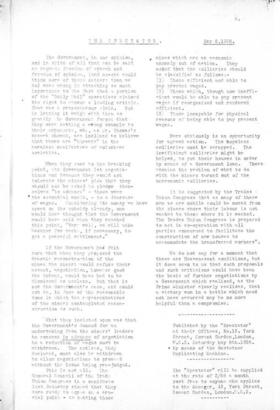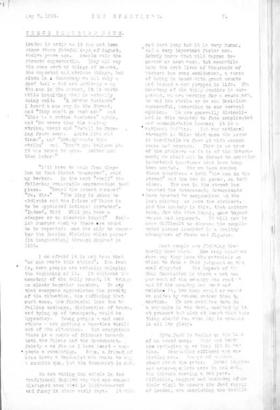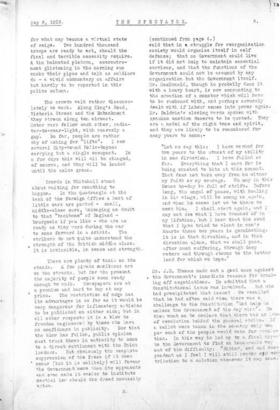The "Spectator" will be supplied at the rate of 2/6d
a month post free to anyone who applies to the Manager, 13, York Street, Covent Garden, London..C.2. London is astir aa.it has net:teen since those fateful days, of August, twelve years. ago. 'People: walk the streets expectantly. They all say the same sort of things of coarse, the expected and obvious things, but since in &. derfLocracy we all rely a good deal but not entirely on the man in the street, it is worth while inquiring wha'; is actually being said. "A rOtten business" I heard a man soy in the St.rnnd, and "They .can't go back now" and "This is a rotten business" again, and "No worse thar the rYllay strike, what1 and be form ing fours sooriLe like 01:1 times", and "Nobody sts ts: this striker and "ronrt believe it. It -7,s bound !7n snyrn. ;otter nusr than .later:' "I'll have be sTaik fhcn Clapham to Fend Street to-morrun', said my barber. In the next "stl" the following remarkable convers'Aion took place. "Fleard the latest .rssour?" "No, Sir." . "The King is going to abdicate and the Prince of Wales is to be appointed National Dictator". "Indeed, Sir? Will you have a shampoo or an electric brush?" Foci jab rumours such these ire bound to be repeated:. one has only :to remember the Russian division which passed (in imagination) through England in 1914.
I am afraid it is not true that 11no one wants this strike". The fact is, some people are actually enjoying the beginning of it. It relieves lo monotony of the daily round; it brings us closer together somehow. To say that everyone appreciates the gravity of the situation,, the suffering. thatn mast come, the financial loss due to falling exclsangen dislocation of trade, and tying up of transport, would be hypocrisy. _Young people. and some others are getting a war-time thril-1 out of the situation. . But everyrhere there -i5 a sense of fairness towards . -noth.the Unions and the..Governmont. n lie:body as far. r.s. I-have.heard • pects a revolution. Trne, a friend of mine knows a ComMo)nist who wants to a machine gun, but the Communist is We are taking the crisis in the traditional English way and one cannot disregard even what is lsht-hearted and funny in tl..ci2e early nays. It will .nct last long but it is very human, and a very important factor now. Nobody knows what will happen tomorrow or next reek, but meanwhile into the drab lives -of thousands of ' workers has come excitement, a-sensecf being in touch with. great events and indeed a new purpose in life. The monotony of the daily routine 'is-suspended, we are working for a cause no-r, to end the strike or to see Socialism successful, according to our several opinion. We are generally disinclined in this Country to face complicated aLe. unconfort,-Ele issues; it is a natier:,1 Lut our national strengtt that once the issue is inevitable we face it with common sense. ssnr7. courage.' This is as true of the strikers as it is of the-Government; We shall all be fore ed to consider industrial quostions that have long been evaded. For we have evaded these questions. both "the man in the street" and the men in power, on both sides. The man in the street has trusted the government; governments: • have trusted to compromises st the.
last minute; so have the strikers-... Ind the tragedy -is this, that matters have, for the time :being, gone, beyond reason-and argument. It will new be more difficult to discuss the compli,cated issues involved in a healthy • atmosphere of facts and figures.
. people are fighting then • hardly know hit. .How many eleetnrs dare say they have the materials en which to form a fair judgment on tle coal dispute? The Report of Coal Commission is there not ton per cent of the country has road -t and if the country has read and weighei it, how many could or wonl.a be guided by reason rather than Iv emotion. We are sett-sing down_to a. strngglo in the dark, excited by it at present bat sick at heart that tnis thing should he,. when hay is opers).ng Ia. all its glory.
Hyde,Park is taksng ex, the le ç of.an armed camp, ;:sts and tents are springing up as t,hcj wa= time. Eecrniting officers are en.
listing men. ' /,?cslIsofsnssiLos.
stand 'r ;.t the gates. Yotor ne.ss in and t ▪ -ns *:11; showing a red pass. .
CfficinSs, haggard arid. unshave after their to ensure the food supply of London, are completing the details
for what may become a virtual state
of seige. Two hundred thousand troops are ready to act, should the final and terrible necessity require. A tin helmeted platoon, accroutrement glistening in the morning sun smoke theirpipes and talk as soldiers do a vivid commentary on affairs tut hardly to be reported in this polite column.
The crowds walk rather disconsolately to work. Along King's Road, Victoria Street and the EMbankment they stream along ten abreast. Motor cars follow each other, radiator-to-rear-light, with scarcely a gap. So far, people are rather shy of asking for "lifts". I saw several City-bound Rolls-Royces carrying but a single occupant. _ In a few days this will all be changed, of course, and they will be loaded until the axles groan.
Crowds in Whitehall stand about waiting for something to happen. In the quadrangle at the back of the Foreign Office a host of little oars are parked small, middle-class cars, belonging no doubt to that "backbone" of England bourgeois if 'you like who are as' ready as they were during the war to came forward in a crisis. The _ strikers do not quite understand the strength of the British middle class. It is invincible, in sense and strength.
Thereare plenty of taxis on the stands. A few pirate omnibuses are on the streets, but for the present the majority of people seem ready enough to walk. Newspapers are at a premium and hard to buy at any
price. The restriction of nevie has its advantages in so far as it would, be very dangerous for inflamatory articles to be. published on either side; but in all other respects it is a blow to .• freedom engineered by, those who have no oonfidence in publicity. Now that the blow has fallen, public opinion must trust those in authority to come to a direct settlement with the Union
leaders. But obviously the complete suppression of the -Press if it (ides
occur (but it is unlikely) will favour
4.1-ie Government more than its opponents an,1 even make it easier to institute martial law should the dread necessity arise.
(continued from page 4.)
said that in t struggle for reorganisation society would organise itself in self defence; that no Government could live if it did not help to maintain essential services, and that the functions of the Government could not be assumed by any organisation but the Government itself. Mr. MacDonald; though he probably does it with a heavy heart, is now consenting to the creation of .a monster which will have to be reckoned with, and perhaps severely dealt with if Labour comes into power again. Mr. Baldwin's closing words spoken with genuine emotion deserve to be quoted. They are a model of the right tone and spirit, and they, are likely to be remembered for many years to come:
"Let me say this: I have worked for two years to the utmost of my ability
in one direction. I have failed so far. Everything that I care for is being smashed to bits at this moment-. That does not take away from me either my faith Cr my. courage. We may in this .House to-day-be full of strife. Before long, the angel of peace, with healing in his wings, will be among us,egain, and when he comes let us be there to
meet him. I shall start again, and I may not see what I have dreamed of in my lifetime, but I know that, the seed that I have tried, to nlant in merits hearts those two years is germinating. It is in that direction, and in that direction alone, that we shall pass, after much suffering, through deep waters and through storms to the better land for which we hope." .
Mr. J.H. Thomas made out a good case against • the Government's immediate reasons for breaking.off negotiations.. He admitted that a
Constitutional issue was involved. But who had precipitated that issue? . He recalled that he. had often said when there was E. challenge to the ponstition "God help us .unless the Government of the day wirt". He then went on to declare that there was no :Afat of revolution behind the general, strike. If a ballot were taken in the country only two per cent of the people would vote for ne7olution...In this way he led up to a final appetl' to the Government to find an honourable way out of the difficulty: "Bitter, sari and despondentas I feel I will Still render mity con: tribution.to a solution whenever it may come.












 Previous page
Previous page